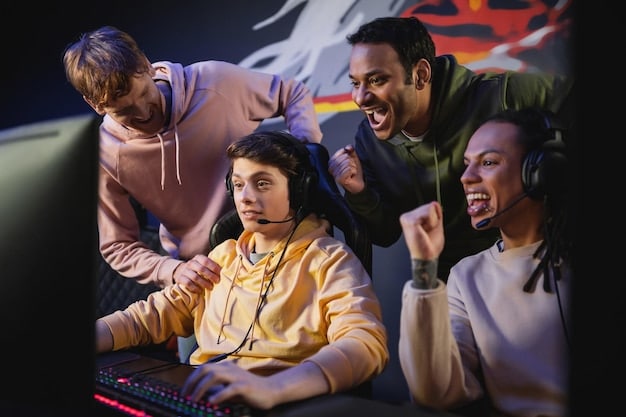Esports Scholarships: Revolutionizing College Athletics in the US

Esports scholarships are transforming college athletics in the US by offering financial aid to talented video game players, reshaping traditional sports programs and creating new opportunities for students.
The intersection of esports and traditional college athletics is becoming increasingly significant in the United States. How Are Esports Scholarships Changing the Landscape of College Athletics in the US? This emerging trend not only provides financial assistance to skilled gamers but also reshapes the dynamics of collegiate sports programs nationwide.
The Rise of Esports in US Colleges
Esports, or competitive video gaming, has exploded in popularity over the last decade. This surge isn’t confined to casual gamers; it’s become a legitimate collegiate sport, with numerous universities across the US offering varsity esports programs.
Initially, many colleges were hesitant to embrace esports, viewing it as a pastime rather than a sport. However, the increasing viewership numbers, sponsorship opportunities, and recognition from traditional sports organizations have compelled them to reconsider. The result is a growing number of colleges investing in esports facilities, hiring coaches, and, most notably, offering esports scholarships.

The Evolution of Collegiate Esports
The evolution of collegiate esports can be traced through several key milestones. Early esports clubs were student-led organizations that organized informal competitions.
With the rising popularity of esports, colleges began recognizing the potential benefits of offering structured programs. This led to the formation of varsity esports teams and the development of dedicated esports facilities. The establishment of organizations like the National Association of Collegiate Esports (NACE) further legitimized esports at the collegiate level.
- Student-Led Clubs: Grassroots organizations forming communities around gaming.
- Varsity Teams: Colleges investing in structured esports programs.
- Dedicated Facilities: Building state-of-the-art arenas for training and competition.
- NACE: Providing governance and structure for collegiate esports.
As more colleges embrace esports, the competitive landscape becomes more intense. The introduction of scholarships has further raised the stakes, attracting talented gamers from across the country to compete for a coveted spot on a varsity esports team.
The Impact of Esports Scholarships
Esports scholarships are financial awards given to students who demonstrate exceptional skill in competitive video gaming. These scholarships can cover tuition, room and board, and other educational expenses, making college more accessible for talented gamers.
One of the primary impacts of esports scholarships is increased accessibility to higher education for gamers. Many talented players may not have the financial means to attend college without assistance, and esports scholarships provide a pathway to pursue their academic goals while also pursuing their passion for gaming.
Attracting Top Talent
Esports scholarships act as a powerful magnet, luring skilled gamers to colleges that offer them. These scholarships allow colleges to build competitive esports teams by recruiting talented players from across the nation and even internationally.
The competition for top talent is fierce, with colleges vying to attract the best players in games like League of Legends, Overwatch, and Rocket League. Esports scholarships give colleges a competitive edge in this recruitment process, enabling them to secure highly skilled players who can elevate their esports programs.
- National Recruitment: Colleges reaching out to talented gamers nationwide.
- International Appeal: Attracting gamers from around the world.
- Competitive Advantage: Scholarships help colleges secure top-tier players.
- Elevated Programs: Skilled players boost the overall level of esports programs.
The introduction of esports scholarships has also led to increased professionalization within collegiate esports. Players are more likely to treat their gaming as a serious commitment, dedicating countless hours to practice and skill development. This increased level of dedication translates into higher-quality gameplay and more competitive matches.
Reshaping Traditional Sports Programs
The rise of esports and the introduction of esports scholarships are beginning to reshape traditional sports programs in colleges across the US. As esports gains prominence, colleges are re-evaluating their athletic priorities and resource allocation.
One of the most significant changes is the diversion of resources from traditional sports to esports. Some colleges are reallocating funds from less popular or less successful sports programs to support the development of their esports programs. This shift reflects the growing recognition of esports as a viable and valuable athletic pursuit.

Resource Allocation
The allocation of resources is a critical decision for college athletic departments. With limited budgets, colleges must carefully consider how to distribute funds among various sports programs.
As esports gains traction, some colleges are choosing to invest more heavily in esports, recognizing its potential for generating revenue, attracting students, and enhancing the college’s reputation. This investment may come at the expense of other sports programs, leading to difficult choices for athletic administrators.
- Budgetary Shifts: Reallocating funds from traditional sports to esports.
- Revenue Generation: Esports programs attracting sponsorships and viewership.
- Student Recruitment: Esports boosting college enrollment.
- Reputation Enhancement: Successful esports programs improving college image.
However, there are also opportunities for synergy between traditional sports and esports. Some colleges are exploring ways to integrate esports into their existing athletic programs, leveraging the skills and resources of both to create more comprehensive and diverse athletic opportunities for students.
The Academic Benefits of Esports
While esports is primarily viewed as a competitive activity, it also offers significant academic benefits for students. Participating in esports can enhance cognitive skills, improve teamwork and communication abilities, and provide valuable learning experiences.
One of the most significant academic benefits of esports is the development of critical thinking and problem-solving skills. Esports games often require players to analyze complex situations, strategize effectively, and make quick decisions under pressure. These skills are transferable to academic settings, helping students to approach challenges with a more analytical and strategic mindset.
Skill Development
Esports promotes the development of several valuable skills that are applicable to academic and professional pursuits.
For example, teamwork and communication are essential for success in many esports games. Players must work together effectively, communicate clearly, and coordinate their actions to achieve common goals. These skills are highly sought after in various fields, including business, engineering, and healthcare.
- Critical Thinking: Analyzing complex situations and making strategic decisions.
- Problem-Solving: Developing effective solutions to challenges.
- Teamwork: Collaborating with others to achieve common goals.
- Communication: Clearly articulating ideas and coordinating actions.
Additionally, participation in esports can enhance students’ time management and organizational skills. Esports players often have demanding practice schedules, which require them to balance their gaming commitments with their academic responsibilities. This helps them develop strong time management skills and learn how to prioritize tasks effectively.
Challenges and Controversies
Despite the growing popularity and acceptance of esports, there are still challenges and controversies surrounding its integration into college athletics. Concerns about gender inequality, the potential for addiction, and the lack of regulation are among the issues that need to be addressed.
One of the primary challenges is the persistent gender inequality in esports. While esports is generally considered to be more inclusive than traditional sports, women are still underrepresented in competitive gaming. This disparity is often attributed to societal norms, gender stereotypes, and a lack of opportunities for women in esports.
Addressing Inequality
Efforts to address gender inequality in esports are gaining momentum, with various organizations and individuals working to create more inclusive and equitable gaming environments.
These efforts include promoting female representation in esports tournaments, providing mentorship and training opportunities for women, and challenging gender stereotypes that discourage women from participating in competitive gaming. Additionally, some colleges are actively recruiting female esports players and creating women-only esports teams to promote gender diversity within their esports programs.
- Promoting Representation: Showcasing female gamers in tournaments.
- Mentorship Programs: Providing guidance and support for women in esports.
- Challenging Stereotypes: Dismantling gender norms that discourage women.
- Active Recruitment: Colleges seeking female esports players.
Another concern is the potential for gaming addiction among college students. Esports can be highly addictive, and some students may struggle to balance their gaming habits with their academic and social lives. Colleges need to provide support and resources to help students manage their gaming habits and prevent addiction.
The Future of Esports Scholarships
The future of esports scholarships in the US looks promising, with continued growth and expansion expected in the coming years. As more colleges embrace esports and invest in their esports programs, the demand for esports scholarships is likely to increase.
One of the key trends to watch is the standardization of esports scholarship criteria and requirements. Currently, different colleges have different standards for awarding esports scholarships, which can make it difficult for students to navigate the application process. As esports becomes more integrated into college athletics, there is a need for greater consistency and transparency in the awarding of scholarships.
Standardization and Growth
The standardization of esports scholarships will help ensure that the most talented and deserving students receive financial assistance to pursue their academic and gaming goals.
Additionally, the growth of esports is expected to lead to the creation of more specialized esports scholarships. Currently, most esports scholarships are general awards that can be used for any esports game. However, as the esports landscape becomes more diverse, there may be a need for scholarships that are specifically targeted at players in particular games or genres.
- Standardized Criteria: Consistent requirements for esports scholarships.
- Increased Transparency: Clear and open application processes.
- Specialized Scholarships: Awards targeted at specific esports games.
- Continued Growth: Esports programs expanding and attracting more students.
The future of esports scholarships also includes the integration of esports into academic curricula. Some colleges are beginning to offer courses and degree programs in esports, providing students with a more comprehensive education in the field. These programs may include esports scholarship components, allowing students to combine their academic studies with their gaming pursuits.
| Key Point | Brief Description |
|---|---|
| 🎮 Esports Scholarships | Financial aid for skilled gamers, boosting college access. |
| 💰 Resource Shifts | Colleges reallocating funds to support growing esports programs. |
| 🧠 Academic Benefits | Esports enhance critical thinking, teamwork, and time management. |
| ⚖️ Challenges | Addressing gender inequality and potential for gaming addiction. |
FAQ
▼
Esports scholarships are financial awards given to students who excel in competitive video gaming. These scholarships can cover tuition, room and board, and other educational expenses at colleges and universities.
▼
Numerous colleges across the US offer esports scholarships, including institutions like the University of California, Irvine, Robert Morris University, and Maryville University. The number is continually growing.
▼
To secure an esports scholarship, students often need exceptional gaming skills, a strong academic record, and good teamwork and communication abilities. Coaches look for players who can contribute both in-game and as team members.
▼
Esports scholarships can prompt colleges to reallocate resources, potentially diverting funds from less popular traditional sports to support growing esports programs. This shift reflects the increasing recognition of esports.
▼
Potential downsides include gender inequality and the risk of gaming addiction. Colleges need to address these issues by promoting inclusivity and providing resources to help students balance gaming with academic and social lives.
Conclusion
In conclusion, esports scholarships are rapidly reshaping the landscape of college athletics in the US, providing new opportunities for talented gamers, driving investment in esports programs, and challenging traditional sports programs. While challenges remain, the future of esports scholarships looks bright, offering exciting prospects for students and colleges alike.





